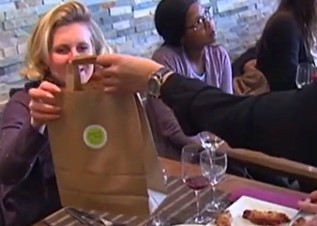The Spanish Council of Ministers on Tuesday approved the draft law on the prevention of food loss and waste. This reduces the disposal of unused food and encourages better use of food.
The proposal includes measures such as the obligation for restaurants to offer their customers leftover food. This should be offered at no extra cost and in recyclable packaging. This offering of the so-called ‘doggy bag’ is a phenomenon that originated in the United States. If restaurants do not cooperate, they risk a fine of €2,000.
Groundbreaking legal instrument
During his presentation at the press conference after the Council of Ministers, the Minister of Agriculture, Fisheries and Food, Luis Planas, stressed that this is a pioneering legal instrument. It is designed to ‘regulate and raise awareness’ and to prevent ‘inefficiencies in the food chain’ with economic, environmental and social consequences.
Planas said that now only France and Italy have a similar regulation in the EU and stressed that one of the objectives is awareness-raising, as 40% of losses occur in shops and homes and another 20% within other links of the food chain. The bill includes measures to prevent the possibility of a ‘food crisis’ and the need for food production in the world. The aim is to prevent food loss throughout the food chain, from harvest to consumption. In 2020, Spanish households wasted 1.3 billion kilos, an average of 31 kilos per person.
Leftover food and donations
Besides the catering industry and households, companies also play a role in the fight against food waste; they have to determine the destination of food in order to prevent food from being thrown away. The starting point is that human consumption through donation or redistribution of food takes precedence. However, in order to be able to donate surplus food, there is a process to go through. Parties in the food chain must conclude cooperation agreements with companies, social initiative agencies and other non-profit organisations or food banks. These agreements must explicitly mention, among other things, the conditions for collection, transport and storage of the products.
Social institutions that receive surpluses must ensure the traceability of the donated products by means of a recording system . This must log the entry and exit of food products received and delivered. Only these specified products can be given for donation, without being allowed to market them under any circumstances, and they must do so without any discrimination between beneficiaries.
Plenty of destinations for unsold food products
Unsold foodstuffs that are in optimal condition should be processed into other foodstuffs, such as juices or jams. When food is no longer fit for human consumption, it should be used for animal feed and the manufacture of animal feed, as a by-product in other industries or as waste and obtaining compost or biofuels.
The Minister confirms consumers will have the ‘right’ for catering companies to provide their leftover food at no extra cost. Furthermore, they must have packaging that is suitable for food and reusable or easily recyclable. This is with the exception in open buffets
Selling imperfect products and extending shelf life
Other measures include requiring retailers to have sales channels for ‘ugly, imperfect or unesthetic’ products, promoting the consumption of seasonal, local or organic products, and encouraging the sale of products with an expiry date or a use-by date.
Planas added that the government will adopt policies to adjust best-before dates to avoid wastage. And, moreover, will encourage parties in the food chain to maximise the best-before dates of its products without compromising quality.
Also read: Food waste law in Spain


